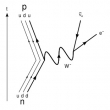See update 8/2/08/ Open Access: "Gratis" and "Libre"

SUMMARY: Our joint statement with Peter Suber noted that both price-barrier-free access and permission-barrier-free access are indeed forms of Open Access (OA) and that virtually all Green OA and much of Gold OA today is just price-barrier-free OA, although we both agree that permission-barrier-free OA is the ultimate desideratum.
What we had not anticipated was that if price-barrier-free OA were actually named by its logical condition as "Weak OA" (i.e., the necessary condition for permission-barrier-free OA) then that would create difficulties for those who are working hard toward the universal adoption of the mandates to provide price-barrier-free OA (Green OA self-archiving mandates) that are only now beginning to grow and flourish.
So we are looking for a shorthand or stand-in for "price-barrier-free OA" and "permission-barrier-free OA" that will convey the distinction without any pejorative connotations for either form of OA. The two forms of OA stand defined, explicitly and logically. They are now in need of value-neutral names (e.g., BASIC vs. FULL OA).
"Weak/Strong" marks the
logical distinction between two forms of OA: price-barrier-free access is a
necessary condition for permission-barrier-free access, and permission-barrier-free access is a
sufficient condition for price-barrier-free access. That is the logic of weak vs. strong conditions.
But since Peter Suber and I
posted the distinction, noting that
both price-barrier-free access and permission-barrier-free access are indeed Open Access (OA), many of our colleagues have been contacting us to express serious concern about the unintended pejorative connotations of "weak."
As a consequence, to avoid this unanticipated and inadvertent bias, the two types of OA cannot be named by the logical conditions (weak and strong) that define them. We soon hope to announce a more transparent, unbiased pair of names. Current candidates include:
Transparent, self-explanatory descriptors:USE OA vs. RE-USE OA
READ OA vs. READ-WRITE OA
PRICE OA vs. PERMISSION OA
Generic descriptors:BASIC or GENERIC or CORE OA vs. EXTENDED or EXTENSIBLE or FULL OA
SOFT OA vs. HARD OA
EASY OA vs. HARD OA
(My own sense it that the consensus is tending toward BASIC vs. FULL OA.)
The ultimate choice of names matters far less than ensuring that the unintended connotations of "weak" cannot be exploited by the opponents of OA, or by the partisans of one of the forms of OA to the detriment of the other. Nor should mandating "weak OA" be discouraged by the misapprehension that it is some sort of sign of weakness, or of a deficient desideratum
The purpose of our joint statement with Peter Suber had been to make explicit what is already true de facto, which is that
both price-barrier-free access and permission-barrier-free access are indeed forms of Open Access (OA), and referred to as such, and that virtually all Green OA today, and much of Gold OA today, is just price-barrier-free OA, not permission-barrier-free OA, although we both agree that permission-barrier-free OA is the ultimate desideratum.
But what Peter Suber and I had not anticipated was that if price-barrier-free OA were actually named by its logical condition as "Weak OA" (i.e., the necessary condition for permission-barrier-free OA) then that would create difficulties for those who are working hard toward the universal adoption of the mandates to provide price-barrier-free OA (Green OA self-archiving mandates) that are only now beginning to grow and flourish.
In particular,
Professor Bernard Rentier, the Rector of the University of Liege (which has adopted a Green OA self-archiving
mandate to provide price-barrier-free OA) is also the founder of
EurOpenScholar, which is dedicated to promoting the adoption of Green OA mandates in the universities of Europe and worldwide. Professor Rentier advised us quite explicitly that if price-boundary-free OA were called "Weak OA," it would make it much harder to persuade other rectors to adopt Green OA mandates -- purely because of the negative connotations of "weak."
Nor is the solution to try instead to promote permission-barrier-free ("Strong OA") mandates, for the obstacles and resistance to that are far, far greater. We are all agreed that it is not realistic to expect consensus from either authors, university administrators or funders on the adoption of, or compliance with, mandates to provide permission-barrier-free OA at this time, and that the growth of price-barrier-free OA should on no account be slowed by or subordinated to efforts to promote permission-barrier-free OA (though all of us are in favour of permission-barrier-free OA too).
So, as the label "weak" would be a handicap, we need another label. The solution is not to spell it out longhand every time either, as "price-barrier-free OA," etc. That would be as awkward as it would be absurd.
So we are looking for a shorthand or stand-in for "price-barrier-free OA" and "permission-barrier-free OA" that will convey the distinction without any pejorative connotations for either form of OA. The two forms of OA stand defined, explicitly and logically. They are now in need of value-neutral names.
Suggested names are welcome -- but not if they have negative connotations for either form of OA. Nor is it an option to re-appropriate the label "OA" for only one of the two forms of OA.
Stevan Harnad



